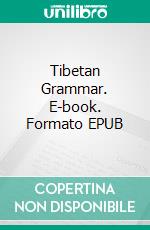H A Jaschke eBooks
eBooks di H A Jaschke
A Tibetan-English Dictionary: With Special Reference to the Prevailing Dialects; To Which Is Added an English-Tibetan Vocabulary. E-book. Formato PDF Heinrich August Jäschke - Forgotten Books, 2017 -
This work represents a new and thoroughly revised edition of a Tibetan — German Dictionary, which appeared in a lithographed form between the years 1871 and 1876. During a residence, which commenced in 1857 and extended over a number of years, on the borders of Tibet and among Tibetan tribes, I and my colleagues gathered the materials for this Dictionary. We had to take primarily into account the needs of missionaries entering upon new regions, and then of those who might hereafter follow into the same field of enterprize. The chief motive of all our exertions lay always in the desire to facilitate and to hasten the spread of the Christian religion and of Christian civilization, among the millions of Buddhists, who inhabit Central Asia, and who speak and read in Tibetan idioms. A yet more definite object in?uenced my own personal linguistic researches, in as much as I had undertaken to make preparations for the translation of the Holy Scrip tures into the Tibetan speech. I approached and carried forward this task by way of a careful examination of the full sense and exact range of words in their ordinary and common usage. For it seemed to me that, if Buddhist readers were to be brought into contact with Biblical and Christian ideas, the introduction to so foreign and strange a train of thought, and one making the largest demands upon the character and the imagi nation, had best be made through the medium of a phraseology and diction as simple, as clear, and as popular as possible. My instrument must be, as in the case of every successful translator of the Bible, so to say, not a technical, but the vulgar tongue. Thus, in contrast to the business of the European philologist, engaged in the same domain, who quite rightly occupies himself with the analysis and commentary of a lite rary language, the vocabulary and terminology of which he finds mainly deposited in the Speculative writings of the Buddhist philosophers, it became my duty to embrace every opportunity, with which my presence on the spot favoured me, to trace the living powers of words and of expressions through their consecutive historical applications, till I reached their last signification in their modern equivalents, as these are embodied in the provincial dialects of the native tribes of our own time.
Tibetan Grammar. E-book. Formato EPUB H. A. Jaschke - Books On Demand, 2022 -
The Tibetan Alphabet was adapted from the Lanc'a form of the Indian letters by T'on-mi-sam-bho-ta minister of king Sron-tsan-gam-po about the year 632. The Indian letters out of which the single Tibetan characters were formed are given in the following table in their Nagari shape.

